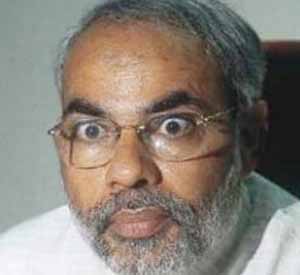 Varanasi, April 15: The climb from the ghats of Varanasi to New Delhi's 7 Race Course Road is proving to be steep and replete with roadblocks for Bharatiya Janata Party's prime ministerial aspirant Narendra Modi, veteran Rashtriya Swayamsevak Sangh (RSS) organizers admit.
Varanasi, April 15: The climb from the ghats of Varanasi to New Delhi's 7 Race Course Road is proving to be steep and replete with roadblocks for Bharatiya Janata Party's prime ministerial aspirant Narendra Modi, veteran Rashtriya Swayamsevak Sangh (RSS) organizers admit.
"The BJP and RSS have given us the target of securing a victory margin of three lakh votes for Modi. He would be lucky if he manages to win by 30,000 to 40,000 votes. There are three parallel setups, often working at cross-purposes, entrusted with the task of managing Modi's election campaign. Is this how a war is fought and won," asked a veteran RSS organizer, who has managed successive Lok Sabha, state assembly and Varanasi Municipal Corporation elections since 1977.
One set of workers comprise the local RSS cadre, who religiously attend the shakhas held every morning in their respective localities. Another set is that of mid-level RSS organizers sent to Varanasi from different parts of the country. The third set comprises of city and district party functionaries of the BJP.
"Those from outside Varanasi are handicapped because they don't know the local Bhojpuri language, the lingua franca of residents of Varanasi," says the RSS veteran, who is not only fluent in Tamil, Telugu, Kannada and Marathi, besides Hindi and Bhojpuri, but also knows by name each and every family residing in the intricate maze of narrow lanes and bylanes of the city.
"Being the BJP's prime ministerial candidate, Modi is widely known thanks to the high exposure in television and print media. But this need not necessarily translate into votes in his favour," he said, while not wishing to be identified as per organisational discipline.
"During election time, voters demand concrete assurance from the candidates and their party workers to redress their grievances concerning public utilities and civic services such as water, drainage, roads, hospital, school and livelihood," he added.
Modi's campaign workers lack motivation. "Gone are the days when RSS volunteers and BJP workers used to put in their own time and money to campaign for the party candidates. All political parties now engage paid workers, and the BJP is no exception," said another RSS organizer.
"For many political workers, election time is when they get the chance to make money," said Sunil Tripathi, a former activist of the JP movement of the 1970s.
Old-timers of RSS and BJP are also uncomfortable with Modi's campaign style and the use of information communication technology - the internet and the mobile phone. "BJP's district and city unit presidents don't even know how to send and receive an SMS, leave aside using emails and social networking websites," a BJP municipal councilor said.
Modi's campaigners who have converged here from different parts of the country are mostly IT-savvy young men with whom the local party workers find it difficult to strike a rapport.
Lack of coordination and communication problem between the locals and outsiders apart, a more serious challenge facing Modi's campaigners is how to tackle the complex caste factor - the political alignments of various caste and community groups. Of the 16,00,000 voters in the Varanasi Lok Sabha constituency, there are over 300,000 Muslims.
Underworld figure Mukhtar Ansari's decision against contesting from Varanasi has dashed the BJP's hopes of splitting the Muslim votes and at the same time polarizing the Hindu votes in Modi's favour.
Yet another development that does not augur well for Modi was the fielding of Ajay Rai, a three-time legislator, by the Congress from Varanasi. Rai belongs to the powerful Bhumihar caste. The Kashi Naresh (king of erstwhile princely state of Banaras) is also a Bhumihar. There are over 40,000 Bhumihar families in the constituency.
As if utter disorder in the BJP's campaign team and the caste-community factors were not enough to upset Modi's apple cart, the decision by Aam Aadmi Party's national convenor Arvind Kejriwal to become his challenger has aggravated his worries.
"We don't know what issues Kejriwal is going to rake up and in which manner during his week-long stay in Varanasi beginning April 15. He is bound to spring a lot of surprises," a senior RSS campaign manager concluded.
Apprehensions and the disorderly campaign machinery apart, Modi is widely expected to win, though a low victory margin could dent his image.





Comments
Add new comment